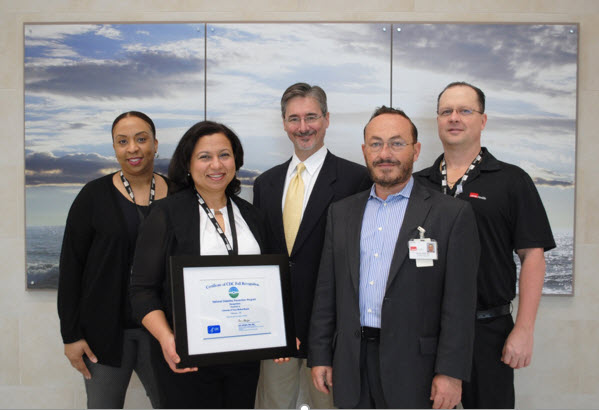Paving the way for diabetes prevention, UTMB is now the only institution in the Greater Houston Area—and 1 of only 5 in the State of Texas—to have a Diabetes Prevention Program (DPP) fully-recognized by the Centers for Disease Control and
Prevention (CDC).
More than 84 million U.S. adults have prediabetes, a condition where blood sugar is higher than normal but not high enough yet to be diagnosed as diabetes. People with prediabetes are at high risk for type 2 diabetes (the most common type of diabetes),
heart disease and stroke. In the last 20 years, the number of adults diagnosed with diabetes has more than tripled.
The good news? DPP providers like UTMB can help people with prediabetes prevent or delay type 2 diabetes and other serious health problems by offering evidence-based, affordable and high-quality lifestyle change programs. UTMB has implemented the CDC’s
approved, one-year structured lifestyle change curriculum, PreventT2, that promotes a healthier diet and increased physical activity. Such interventions can reduce the incidence of diabetes by 58 percent among adults with prediabetes and by 71 percent
in those aged 60 years or older, according to the CDC.
The journey to national recognition began with Dr. Nicola Abate, professor and chief in the UTMB Division of Endocrinology, who had a vision of better health for his patients that paved the way to where UTMB’s program is today. “Diabetes prevention
and care is a key focus of UTMB’s Endocrinology program,” says Dr. Abate. “Diabetes is a disease that affects so many people, and it’s a tremendous contributor to morbidity and mortality in our population. Our recognition by
the CDC makes a big difference in terms of receiving the support we need to expand this initiative to our greater patient population.”
Dr. Hanaa Sallam, a research scientist and coordinator of UTMB’s DPP, is certified by the American Association for Diabetes Educators as a lifestyle coach. She has been implementing PreventT2 for more than two years. “We are extremely proud
of this achievement; however, this is just the beginning!” she says. “The next step is to complete an application to the Centers for Medicare and Medicaid Services to become a Medicare DPP provider. “With approval, UTMB will be able
to receive reimbursement whenever a Medicare participant is enrolled in the program. Other private insurance entities also cover participation in DPPs,” she explains.
UTMB recently expanded the DPP with the certification of two additional lifestyle coaches, Michael Washburn, program manager of UTMB’s Angleton Danbury Campus Community Resources, Wellness and Volunteer Services, and Dr. Raquel Pena, a research
scientist in the UTMB Department of Psychiatry and Behavioral Science.
With CDC’s recognition, UTMB now has the capacity to not only provide DPP services to our population with prediabetes but also to be contracted by other institutions. Dr. Sallam plans to partner with other University of Texas System institutions
in the future through a contract with the Texas Department of State Health Services. She also wants to train more lifestyle coaches to continue the program’s growth.
Dr. Ann Albright, director of the Division of Diabetes Translation
at the CDC, applauds UTMB’s program, noting efforts like UTMB’s are turning the tide in the fight against the epidemic of type 2 diabetes.

Members of UTMB Health's T2 Program team (from left to right): Dr. Raquel Pena, Dr. Hanaa Sallam, Gene Felter, Dr. Nicola Abate and Michael Washburn.